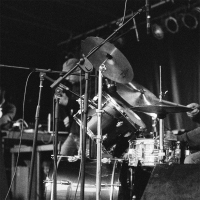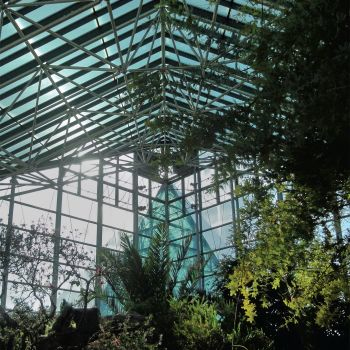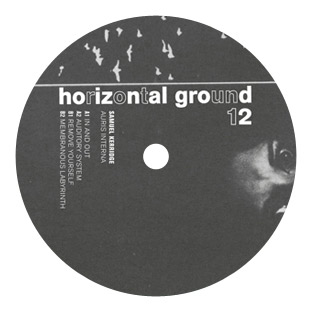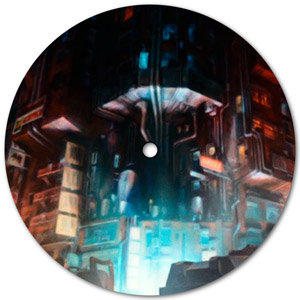There’s no shortage of worthwhile dance music to cover this month. In fact, there’s been far too much of it in the seven weeks or so since the last edition of this column (delayed due to Unsound Festival and a brief period of total musical overload) to compress everything down into a piece of writing that anyone would have the patience to read. So instead, this edition of Hyperspecific focuses mainly on artists operating around the fringes: making use of improvisation, live instrumentation and noise (Upperground Orchestra, Bee Mask), subtracting the forward drive normally required to move a dancefloor (Fatima Al Qadiri, pictured, above), or slowing and darkening their music until it’s barely recognisable as club-friendly (Samuel Kerridge, Kassem Mosse & XDB, Area). Oh, and a fantastic new 12" from Swedish techno maestros Skudge, because it’s been on near-constant rotation over the past few weeks.
Upperground Orchestra – The Eupen Takes
(Morphine)

On the surface, there are a fair few similarities between Beaini’s solo music and his work in ensemble. Both hang on a knife-edge between tight and muscular funk and total rhythmic disarray – often remaining in one mode while flirting ominously with the other – making them refreshingly fluid and unpredictable. Take any particular moment of either Morphosis’ 2011 debut What Have We Learned or The Eupen Takes: both possess a nagging sense that the music could potentially launch off along any number of different trajectories from its current position. Throughout both, Beaini runs a similar line in Radiophonic squawks, Geiger counter grit and modal melodies that hint toward the music of his home country of Lebanon. But where Beaini’s solo work is intended as club music, and thus remains locked within its specific parameters (while admittedly often pushing their boundaries almost to the limit), Upperground Orchestra are free to change tack at will.
This forty-minute recording shapeshifts a disorienting number of times: an opening segment (‘Born Again’) suggesting lounge jazz in a hotel lobby beset by malfunctioning Daleks and swarms of angry metal wasps, is dragged through a prolonged tempo escalation into ‘Memory Shark’s predatory techno jack. Later, it passes through sleazy funk, sun-baked desert ambient, gorgeous and meandering avant rock (‘We Travel The Lands of Stars & Dust’) to a closing section whose percussion is all chatter, wheeze and hum, and buzzes around like traders at a busy street market. The focal point here is some virtuosic and very intuitive drum and saxophone dialogue – the players appear psychically linked, signaling for group shifts in direction within a matter of mere seconds. He might be the group’s most well-known member but Beaini is present as binding factor: his electronics provide enough consistency of tone and atmosphere to hold the entire performance together. Jazz and techno might be the two touchstones here, but between them they find a mutual language – parabolic rhythmic mania punctuated by interludes of blissful calm – that’s an appreciable distance away from either.
Bee Mask – When We Were Eating Unripe Pears
(Spectrum Spools)
Bee Mask – ‘Vaporware’/’Scanops’
(Room40)

New full-length When We Were Eating Unripe Pears – his third for Spectrum Spools after the wonderfully sinister Canzoni Dal Laboratorio Del Silenzio Cosmico and a compilation of older material, Elegy For Beach Friday – is the most beautiful and enigmatic thing he’s released to date. Propulsion and percussion are the order of the day here, made far more explicit than on much of his older material. ‘The Story of Keys & Locks’ is both spectacular and threatening, unfolding triffid-like into a writhing mass of tendrils that coil gracefully around its centre, and ‘Pink Drinq’ chuckles and burbles before erupting in a shower of static and screaming distortion.
Though untethered from either weighty 808 rhythms or the need to function in a club, the overall effect is not too dissimilar from Morphosis, or other techno hypnotists like Donato Dozzy: the same stately inevitability, the same muffled aggression that occasionally simmers over into attack mode, a similarly meditative impact upon the listener. Madak and Beaini also appear to share a mutual respect for the essential autonomy of their machines: they may be at hand to guide them in particular directions, but the individual characteristics and imperfections of the hardware are allowed to play an equal role in defining the music’s nature.

Fatima Al Qadiri – Desert Strike
(Fade To Mind)

Wiley’s early eski riddims and Devil Mixes are clear compositional touchstones here – Al Qadiri’s rubbery melody lines have a similar property of seeming both hi and lo fidelity at once, simultaneously futuristic and obselete – as is the work of contemporaries and fellow eski devotees like Nguzunguzu and Logos. But where Wiley’s music remained solipsistically focused upon its own tight sphere of existence, Al Qadiri’s tracks are like riddles, packed so full of reference points to other places, times and cultures that they’re dizzying to try and unpick. Spiritual, religious and mystical undertones weave their way throughout. The organ trills on ‘War Games’ suggest worship – a less overt companion to ‘Vatican Vibes’, from last year’s Genre-Specific Xperience, where a synthetic choir lent a devotional edge to rattling footwork. ‘Hydra’s squeaky clean textures and synthetic steel pans conjure a weightless digi-utopia equally familiar to both incense-burning New Agers and modern tech-evangelists who dream of one day reassembling minds in cyberspace. The EP’s title and track names hint towards unpleasant truths of military intervention in the Middle East, even as its artwork – fire and a stealth bomber over a roiling CGI ocean, seen through the lens of an iPad-like viewfinder – connects with violence only at a remove.
Desert Strike presents these questions but doesn’t, in and of itself, provide any concrete answers. By and large that’s not a problem. Most tracks here are strong enough to exist by themselves, but lacking the drive of Genre-Specific Xperience, at times they feel frustratingly fragile, beautiful and absorbing miniatures that could be scattered to the wind within a fraction of a second.
Samuel Kerridge – Auris Interna
(Horizontal Ground)

Comparisons with Raime aren’t inaccurate – for a first release, there’s a similarly unusual level of skill to Kerridge’s music not dissimilar to Raime’s incredibly full-formed 2010 debut EP. However, where jungle is a major touchstone for the latter’s sound, techno and house lie at the heart of the four tracks on Auris Interna, albeit bolstered by forays into doom metal and the post industrial meditations of artists like Current 93 and Coil. The kickdrums on opener ‘inANDout’ splat like sacks of wet cement hitting the pavement – a reminder that this is, however obliquely, dance music – but a soft piped melody that whistles across its surface suggests some decrepit folk form, long lost to the ravages of time and only resurrected as a shadow of its former self. ‘Auditory System’ and ‘Membranous Labyrinth’, a pair of sensual and serotonin-drained techno tracks, are the EP’s highlights. Across the former’s surface chuckle time-stretched breaks extended to the point where they rattle the senses – an utterly merciless comedown where the previous night’s music still rings ceaselessly in the ears. The latter is the closest thing to a dancefloor track here, albeit one where metallic thuds emerge slowly and violently from a metallic sheen of abattoir ambience.
FIT ft. Gunnar Wendel & Omar-S – ‘Enter The Fog’/’Roll Out’
(FXHE)
XDB & Kassem Mosse – ‘Ekatem’/’Omrish’
(Diamonds & Pearls)
Area – Not Waiting Anymore
(Until My Heart Stops)


On the subject of deeper-than-deep house – it’s been a rather good month for the stuff – the second release through the recently established Until My Heart Stops comes from enigmatic and practically un-Googleable Chicago-based producer Area (even "Area + Chicago + house + music" doesn’t work that well). Like the label’s first release from Joey Anderson, neither track is going anywhere in a hurry. ‘Munged’ couldn’t be better named, given that it’s caked head-to-toe in warehouse party muck and just about equalised enough by a cocktail of uppers and downers that it’s able to stagger around drunkenly to its own tune. And the lone voice that chants wordlessly throughout ‘Not Waiting Anymore’ is practically its sole feature, save a great aurora of shimmering intergalactic dust that accumulates around the track’s middle. Perhaps surprisingly, fans of Burial will probably find a lot to appreciate here; the latter track in particular stirs up a similar cocktail of nostalgia, comedown blues and derelicts scattered with post-party detritus.
Skudge – ‘Fingers’/’Vessel’
(Nonplus+)




